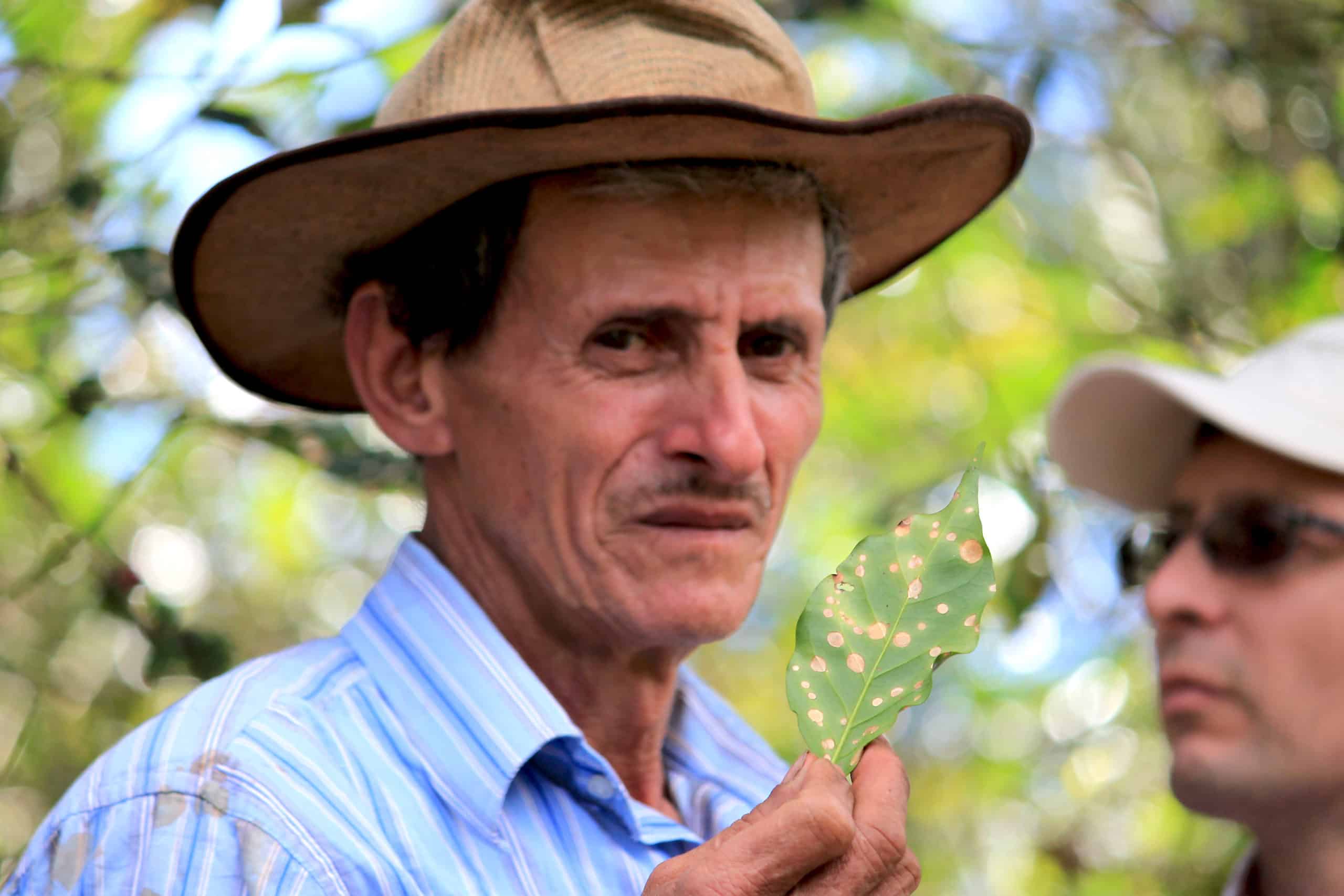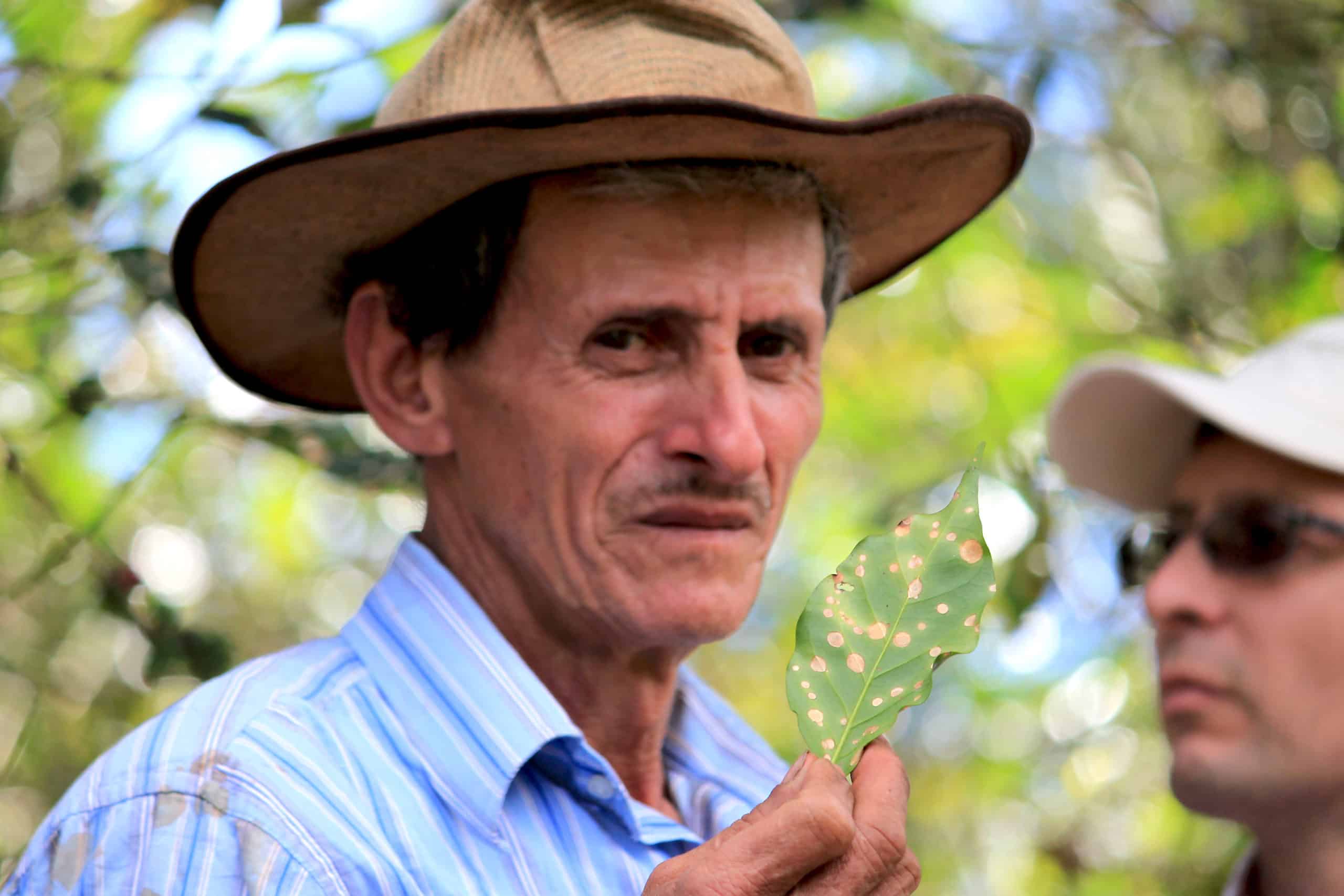

Nicolas Pineda, a coffee farmer and member of the 190-member cooperative Montaña Verde in Honduras.
Note: This piece originally appeared on The Skoll World Forum website as part of a series on entrepreneurial solutions to climate change.
“It feels like a scourge from God,” said Nicolas Pineda as we surveyed row upon row of diseased coffee trees on his farm in Santa Barbara, Honduras. Nicolas showed me how coffee leaf rust, a fungus known as la roya in Spanish, was destroying his 18-year-old farm, turning verdant, productive coffee plants into spindly heaps of leafless sticks. Amid the surrounding lush green hills, the juxtaposition felt cruelly ironic.
In the past year, more than half of the coffee farms in Central America have been affected by la roya, causing the loss of 500,000 coffee-related jobs and approximately $1 billion in revenue. The crop-killing fungus is now active from Mexico to Peru, spreading with the breeze as a windborne spore. Some rural coffee enterprises have been able to cope with the outbreak, often thanks to farmers whose better agronomic practices have helped beat back the fungus. Still, there are thousands of producers like Nicolas who have exhausted their finances in trying to save their farms. As these growers face unemployment and food insecurity, the roya outbreak serves as a powerful reminder of both the fragility of communities dependent on agriculture and the responsibility that supply chains share in responding to climate change.
Warmer, wetter weather is the leading culprit in the current roya outbreak, and it’s no scourge from God. Rather, it’s a clear example of how a hotter planet can wreak havoc on the most vulnerable people through a frontal attack on the land that sustains them. An inauspicious harbinger of what’s to come, the roya crisis has been a wake-up call for the entire coffee industry, as well as its caffeinated consumers. With national emergencies in the Americas, we are forced to recognize that coffee may be the proverbial canary in the coalmine for climate change’s destructive impact on agriculture.
The effect of climate change on farmer livelihoods may well be catastrophic, but there’s still time to act. Responding to complex issues in agricultural industries such as coffee requires precompetitive, multilateral collaboration among all partners in the supply chain. In a spirit of collaboration and with the gumption to tackle roya head on, Root Capital, along with industry leaders like Keurig Green Mountain, Inc., Sustainable Harvest, the Inter-American Development Bank, the Skoll Foundation and many others, has launched the Coffee Farmer Resilience Initiative. The initiative takes a holistic approach to agricultural investment in response to the coffee rust crisis. We’ve emphasized long-term lending to help farmers plant more resilient coffee varietals while pursuing income-diversification strategies to mitigate food insecurity.
Financial management training, combined with technical assistance in climate-smart agronomic practices, will promote the success of renovation investments and income-diversification efforts. Meanwhile, short-term trade finance will, like oxygen, allow the businesses to breathe by getting product to consumers and maintaining market access. This integrated approach is good for farmers who depend on coffee for life, for companies that rely on high-quality coffee to sustain their businesses, and for consumers who care about producer families and are unwilling to witness the extinction of their morning Joe.
Coffee is only the tip of the now melting iceberg, and climate change will continue to impact agriculture in ways we can’t yet predict. The Coffee Farmer Resilience Initiative represents a blueprint for collaboration beyond the coffee industry, in the name of agricultural supply-chain resilience and sustainability around the globe. We must act now, and in tight coordination, to design and implement new responses to climate risks if our food and fiber supplies are to weather the storm.